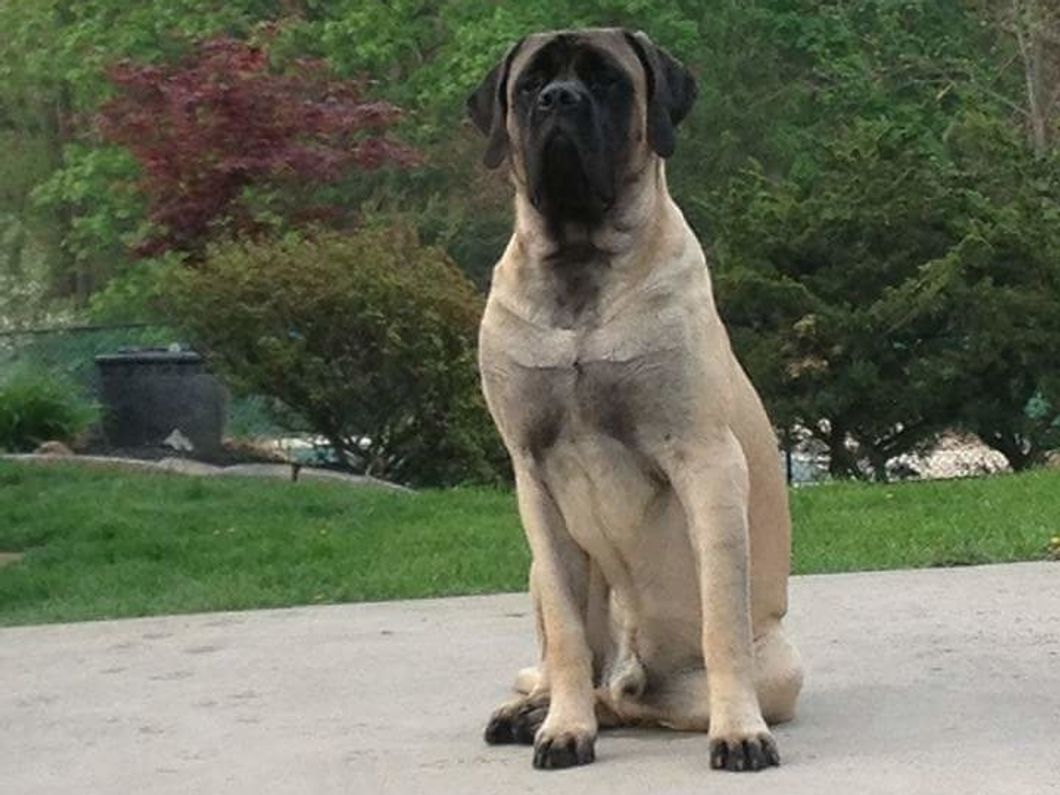Anytime someone sees Cooper, my large 240-pound English Mastiff for the first time, they flock to him saying things like, "Oh my god I want him," or "He's so big and cuddly I cannot wait to own a big dog."
While I love Cooper to death and he is a fantastic dog, people need to know what it is like to own a large dog because he can be a lot to handle.
Too often, people get big dogs for the sake of owning a big dog without doing the proper research into what life is like once you own one of these behemoths.
Once they get them, they realize that they cannot care for them and maintain the upkeep required so they end up in a shelter. Here is what you need to know if you decide to own a large dog.
First off is their diet. Larger breeds usually tend to eat more food than smaller ones. "You could spend anywhere from 60 to 100 dollars a month just on the food alone," English Mastiff owner Donna Ake said.
That is a lot of money, especially if you are coming out of college with a substantial amount of debt or are working a low-level job. Adding that up for an entire year, you could be looking at around $1,200 a year just on food for one of these large guys.
Now that we know what their food intake is like, next on the list is grooming and care.
All dogs are different depending on breed so I cannot really give a clear-cut definition of what you should expect, but you should do all the proper research as to possible problems your breed of dog could have down the line.
I can talk about English Mastiffs though, since that is what I have.
English Mastiffs are short-coat dogs that tend to shed a lot, so make sure you have a good vacuum on hand to clean up the plethora of dog hair that will indeed be on your floor. Mastiffs also tend to drool quite a substantial amount, so you will have to wipe their mouth almost every time they decide to take a drink.
The breed also needs to have regular vet visits to keep on top of things such as dysplasia and joint pain since they are large and it can put a strain on the area, and believe me if surgery is required for a torn ligament or joint, your bank account is going to hurt. So keep on top of those to make sure your friendly neighborhood beast is a healthy pup.
Large dogs can also have a problem with Gastric Dilation Volvulus or GDV, which is basically when their stomach gets twisted and cannot expel gas or waste and can lead to a series of life-threatening consequences. This will require surgery if it does happen, so make sure you are aware of this and the symptoms that can show signs of GDV.
English Mastiffs also require a large amount of space because they are large individuals. While they are not the most active dogs, they still should be able to have a large area in the house and a large area to run into if they decide to do so.
If you have a lot of stairs or a small area, then it might not be the best idea to own an English Mastiff, as they can struggle with them. If neither of these are a problem, then you'll be fine.
Living in an apartment can also work since they are not the most physically active dogs as long as the stairs and space are not a problem for them.
Also, if you decide to take your big friend out for a walk, I hope you are physically fit; once 240 pounds of pure behemoth decides "I want to run after a squirrel!" you better be really to either hold him back or go for a nice run through the park. Also, Mastiffs are quite known to plop down once they overheat or get tired, so be ready to carry them back if you go too far.
Overall though, Mastiffs are quick to learn in obedience training and are great around kids and family. After all, he is a big and loveable teddy bear.
Plus, if anyone decides that they want to break into your humble abode, a deep-echoing bark will be a nice way to drive them away. They are loyal dogs and they can be a great addition to your household as long as you know the proper steps to owning one and the upkeep required.

















